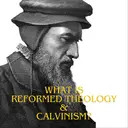00:00
00:01
What is Reformed Theology/Calvinism 15: The Remonstrance & the Synod/Canons of Dort
Series Reformed Theology & Calvinism
220 ( 145 | 75 )
What happened after the death of Jacob Arminius? How did the Dutch Reformed Church respond to the Arminianism of the Remonstrants/Remonstrance? Why was the Synod of Dort needed? Why are the Canons of Dort so important?
See also: W Robert Godfrey, Saving the Reformation: The Pastoral Theology of the Canons of Dort
| Sermon ID | 32824454354143 |
| Duration | 45:16 |
| Date | Mar 27, 2024 |
| Category | Midweek Service |
| Bible Text | Jude 3 |
Add a Comment


